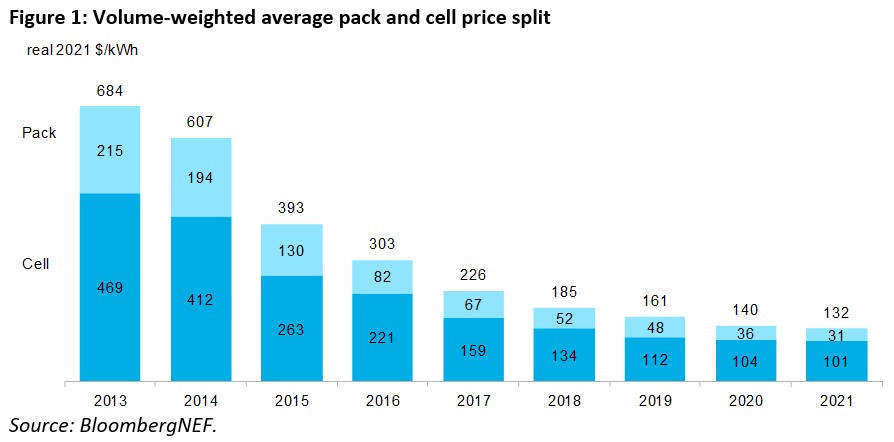BloombergNEF has released their annual battery price report and it found the average price per kWh fell to $132 (£100 / €117) across multiple battery end-uses, including electric vehicles, buses and stationary storage projects.
That’s down from $140 (£106 / €124) per kWh last year and a staggering 89% drop from 2010, when batteries cost more than $1,200 (£906 / €1,063) per kWh.
When it comes to electric vehicles, the situation improves even further as batteries cost an average of $118 (£89 / €104) per kWh. At the cell level, prices hit $97 (£73 / €86) per kWh and this is noteworthy as cells account for 82% of a battery pack’s price.
Also Read: EVs Will Be Cheaper Than ICE Cars By 2027 According To Forecasts
BNEF says the decline in prices can be chalked up to a variety of factors including the increased “adoption of the low-cost cathode chemistry known as lithium iron phosphate” and the decreased used of “expensive cobalt in nickel-base cathodes.” If these trends continue, the price per kWh could drop below $100 (£75 / €88) by 2024. This point is something of a holy grail as it should enable electric vehicles to reach cost parity with models featuring internal combustion engines.
However, there is trouble on the horizon as lithium prices “have risen substantially this year” and higher raw material costs could result in more expensive batteries in 2022. The increase is expected to be small as prices could climb to $135 (£102 / €119) per kWh, but they’re headed in the wrong direction. This also has the potential to push back the date when prices drop below $100 (£75 / €88) per kWh by up to two years.
The lead author of the report, James Frith, said “Although battery prices fell overall across 2021, in the second half of the year prices have been rising.” He went on to point out, “This creates a tough environment for automakers, particularly those in Europe, which have to increase EV sales in order to meet average fleet emissions standards. These automakers may now have to make a choice between reducing their margins or passing costs on, at the risk of putting consumers off purchasing an EV.”






